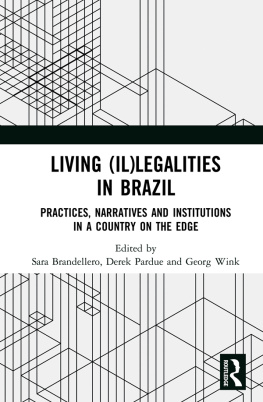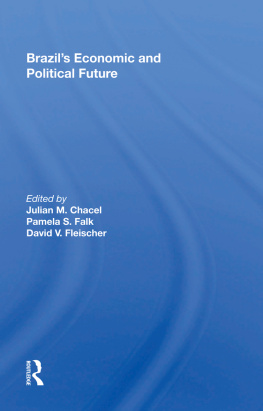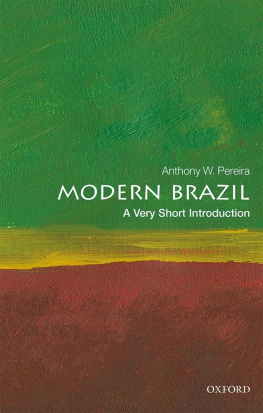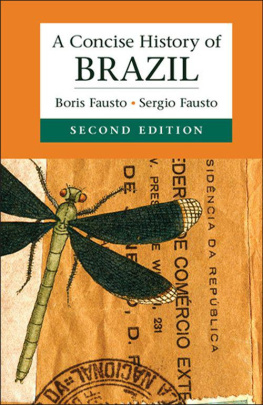Living (Il)legalities in Brazil
Reflecting on some of Brazils foremost challenges, this book considers the porous relationship between legality and illegality in a country that presages political and societal changes in hitherto unprecedented dimensions.
It brings together work by established scholars from Brazil, Europe and the United States to think through how (il)legalities are produced and represented at the level of institutions, (daily) practice and culture. Through a transdisciplinary approach, the chapters cover issues including informal work practices (e.g. street vendors), urban squatter movements and migration. Alongside social practices, the volume features close analyses of cultural practices and cultural production, including migrant literature, punk music and indigenous art.
The question of (il)legalities resonates beyond Brazils borders, as concepts such as lawfare have crept into vocabularies, and countries the world over grapple with issues like state interference, fake news and the definition of illegal migration. This is valuable reading for scholars in Brazilian and Latin American Studies, as well as those working in literary and cultural studies, anthropology, sociology, geography and political science.
Sara Brandellero is Assistant Professor in Brazilian Literature and Culture at Leiden University, the Netherlands, where she is co-Chair of the Latin American Studies programmes. Her research focuses on Brazilian literature and film, and Lusophone cultures more broadly. Her publications include the book On a Knife-Edge: The Poetry of Joo Cabral de Melo Neto (2011) and the edited volume The Brazilian Road Movie (2013).
Derek Pardue, PhD, is Associate Professor of Brazilian Studies within the Global Studies Department at Aarhus University in Denmark. His scholarship focuses on issues of migration, and urbanism throughout the Black Atlantic, specifically the Luso-African world of Brazil, Portugal and Cape Verde.
Georg Wink, PhD, is Associate Professor of Brazilian Studies and Director of the Centre for Latin American Studies at the University of Copenhagen. His research focuses on contemporary Brazilian society, politics and culture with special emphasis on the rise of the new right in Brazil.
Living (Il)legalities in Brazil
Practices, Narratives and Institutions in a Country on the Edge
Edited by
Sara Brandellero Derek Pardue Georg Wink
First published 2020
by Routledge
2 Park Square, Milton Park, Abingdon, Oxon OX14 4RN
and by Routledge
52 Vanderbilt Avenue, New York, NY 10017
Routledge is an imprint of the Taylor & Francis Group, an informa business
2020 selection and editorial matter, Sara Brandellero, Derek Pardue and Georg Wink; individual chapters, the contributors
The right of Sara Brandellero, Derek Pardue and Georg Wink to be identified as the authors of the editorial material, and of the authors for their individual chapters, has been asserted in accordance with sections 77 and 78 of the Copyright, Designs and Patents Act 1988.
All rights reserved. No part of this book may be reprinted or reproduced or utilised in any form or by any electronic, mechanical, or other means, now known or hereafter invented, including photocopying and recording, or in any information storage or retrieval system, without permission in writing from the publishers.
Trademark notice: Product or corporate names may be trademarks or registered trademarks, and are used only for identification and explanation without intent to infringe.
British Library Cataloguing-in-Publication Data
A catalogue record for this book is available from the British Library
Library of Congress Cataloging-in-Publication Data
A catalog record has been requested for this book
ISBN: 978-0-367-36393-2 (hbk)
ISBN: 978-0-429-34563-0 (ebk)
Typeset in Times New Roman
by Newgen Publishing UK
We dedicate this book to the former residents of the Wilton Paes de Almeida building, featured in the introduction of this volume, a mixture of survivors and victims on many different levels. The building collapsed from a massive fire on Labor Day, May 1, 2018. Firefighters looked for 12 days to recover any buried victims under the rubble. They uncovered seven human corpses, six male and one female, including twin boys aged 10. Later the city would report that 6,000 tons of wreckage was hauled to a dump in the northern extremes of the city, an operation that would take 58 days to complete.
The building had been a squatter occupation, a social and material representation of (il)legalities. The majority of occupations in So Paulo are, in fact, ethical. This means that they are non-profit and part of a larger socio-political movement, whose goal is to provide affordable housing to the needy, thereby giving a social use to empty buildings, as stipulated in the Brazilian Federal Constitution of 1988 and, more specifically, in the So Paulo City Statute of 2001. This building was not part of that movement; it was unethical, in that a criminal organization managed it through extortion.
Contents
Sara Brandellero, Derek Pardue and Georg Wink
PART I
Producing (il)legalities
Jean Wyllys
Daniel Hirata
Igor Machado and Derek Pardue
Georg Wink
Mrcia Tiburi
PART II
Representing (il)legalities
Alexander S. Dent
Gabriel Feltran
Stephanie Dennison
Sara Brandellero
Claire Williams
Lcia S and Felipe Milanez Pereira
Sara Brandellero is Assistant Professor in Brazilian literature and culture at Leiden Universitys Centre for the Arts in Society, where she is co-Chair of the BA, MA and ResMA programmes in Latin American Studies. She is co-founder and steering committee member of REBRAC (European Network of Brazilianists Working in Cultural Analysis/Rede Europeia de Brasilianistas de Anlise Cultural), with Prof. Stephanie Dennison and Dr Tori Holmes. Her research engages more specifically with issues of space and mobility, migration and diaspora, in Brazilian literature and culture and transnational/Lusophone contexts. Her publications include the book On a Knife-Edge: The Poetry of Joo Cabral de Melo Neto (OUP 2011), and the edited volumes The Brazilian Road Movie (UWP 2013), Graciliano Ramos and the Making of Modern Brazil: Memory, Politics and Identities (with Lucia Villares; UWP 2017). She is Project Leader of the HERA-funded collaborative research project Night Spaces: Migration, Culture and Integration in Europe (NITE), 20192022.
Stephanie Dennison holds a Chair in Brazilian Studies at the University of Leeds, UK, where directs the Centre for World Cinemas and Digital Cultures. She has published widely on World Cinema, Latin American cinema and Brazilian film culture. Her latest monograph, Remapping Brazilian Film Culture in the 21st Century, was published by Routledge in 2019.
Alexander S. Dent is a linguistic and cultural anthropologist who has taught at the George Washington University for 14 years. His work analyzes media, language, piracy and intellectual property. His first book, on Brazilian country music, was published by Duke University Press in 2009. His second book is








